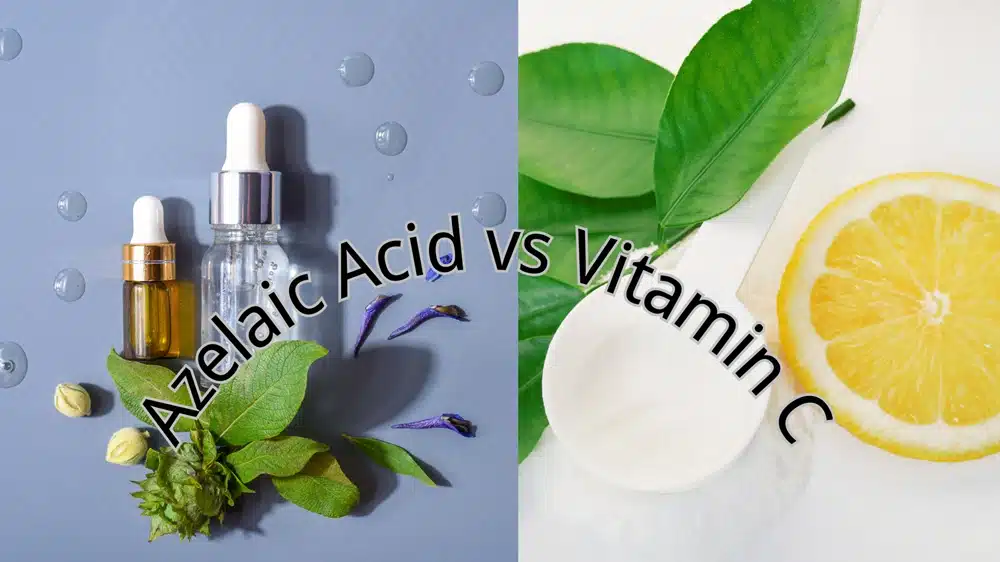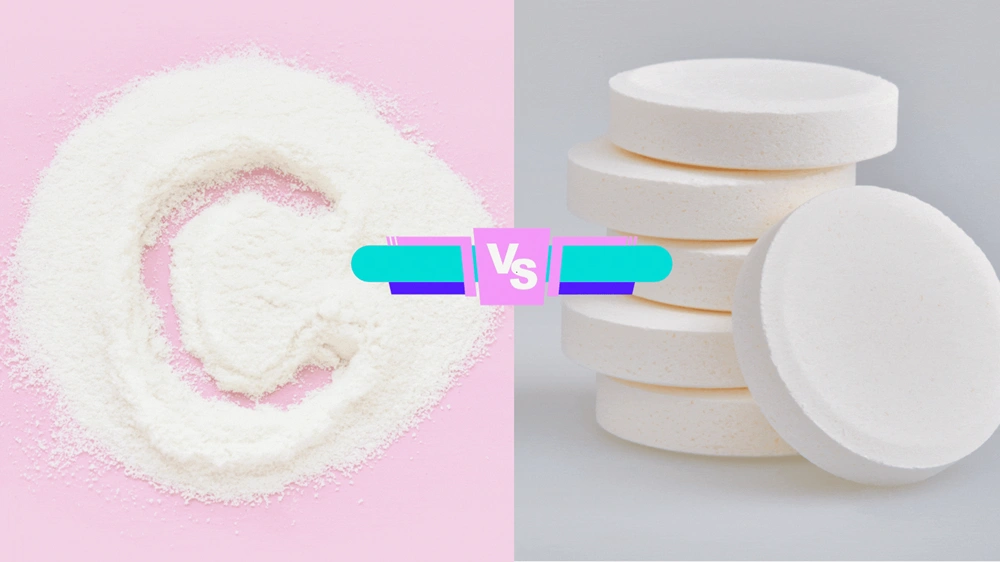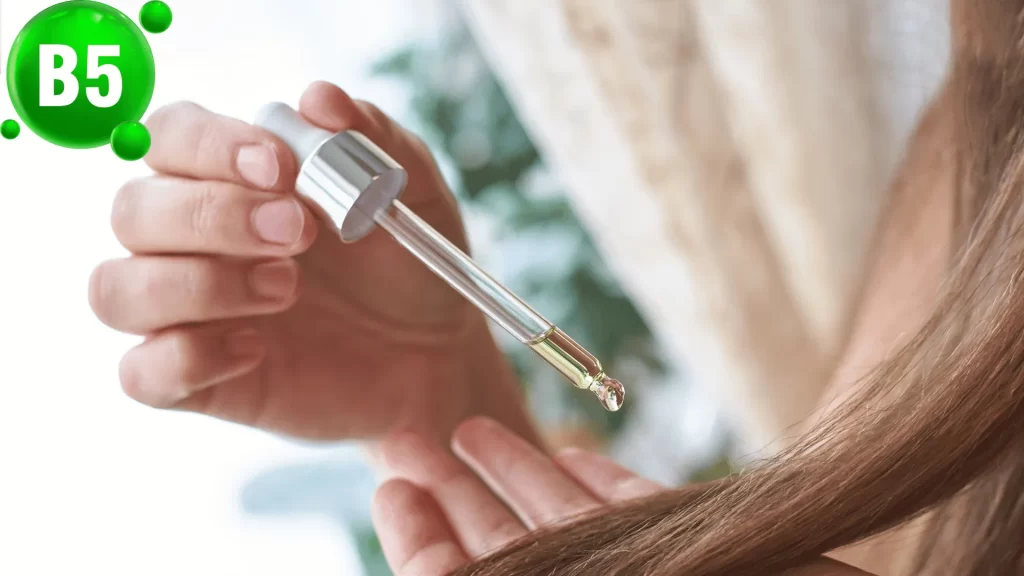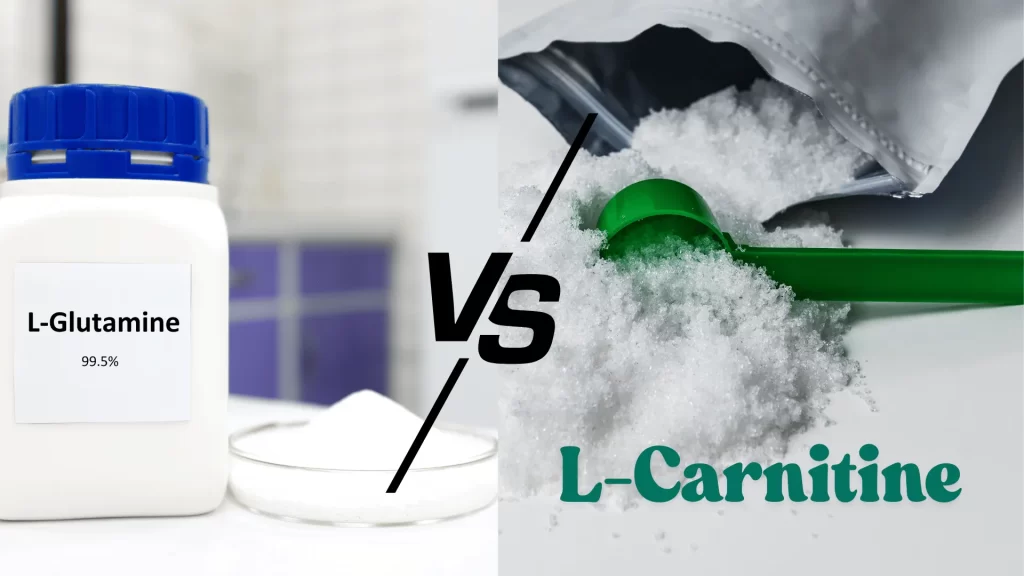Picture this: you’re standing in the skincare aisle, completely overwhelmed. On one side, there’s the ever-popular vitamin C, practically glowing with promises of radiant skin. On the other? The mysterious azelaic acid, quietly confident in its corner. If you’ve ever felt torn between these two powerhouses, trust me, you’re not alone!I remember the first time I heard about azelaic acid – I thought it sounded like something from a chemistry textbook that would burn my face off. Boy, was I wrong! And vitamin C? Well, we all know that friend who swears by their vitamin C serum like it’s liquid gold. But here’s the million-dollar question: which one actually deserves that prime real estate on your bathroom shelf?

If you don’t want to scroll through too much content, you can also jump directly to the Azelaic Acid vs Vitamin C table to give you a clear comparison Azelaic Acid vs Vitamin C table.
What Makes Vitamin C the Golden Child of Skincare?
Let’s start with the celebrity of the skincare world – vitamin C. This isn’t just your grandma’s orange juice recommendation anymore! According to research published in the Journal of Clinical and Aesthetic Dermatology, vitamin C (or L-ascorbic acid, if we’re being fancy) is like that overachieving student who’s good at everything.
The Science Behind Vitamin C Benefits
Here’s where it gets exciting – vitamin C benefits go way beyond just brightening. Studies show that this powerhouse ingredient boosts collagen production by up to 50% when used consistently (Pullar et al., 2017). That’s like giving your skin its own personal construction crew! It works by neutralizing free radicals – those pesky molecules that age our skin faster than binge-watching Netflix until 3 AM.
But wait, there’s more! Vitamin C for skin also helps with:
- Reducing dark spots and hyperpigmentation (with results visible in as little as 16 weeks)
- Protecting against UV damage (though please, still wear your SPF!)
- Improving skin texture and reducing fine lines
- Giving you that “I just came back from vacation” glow
Different Forms: From Vitamin C Powder Bulk to Tablets
Now, here’s where things get interesting for those interested in dietary supplement ingredients and OEM solutions. Vitamin C comes in more forms than a transformer! You’ve got your classic serums, sure, but did you know about vitamin C powder bulk options? These are perfect for powder supplement manufacturing companies looking to create custom formulations.
And let’s not forget about vitamin C tablets – the internal approach to glowing skin. While topical application gives you direct benefits, vitamin C supplement options work from the inside out. According to the National Institutes of Health, adults need about 90mg (men) or 75mg (women) daily. That’s roughly equivalent to one large orange, but who has time to peel oranges every day?
Meet Azelaic Acid: The Underdog with Surprising Powers
Now, let me introduce you to azelaic acid – the quiet kid in class who turns out to be a genius. This naturally occurring acid (found in grains like wheat and barley) might not have vitamin C’s star power, but oh boy, does it deliver results!
How Azelaic Acid Works Its Magic
Research from the International Journal of Dermatology shows that azelaic acid works on multiple levels. It’s like a Swiss Army knife for your skin! At concentrations of 15-20%, it:
- Kills acne-causing bacteria (take that, P. acnes!)
- Reduces inflammation by up to 35%
- Normalizes skin cell turnover
- Fades post-inflammatory hyperpigmentation
The best part? It’s gentler than a butterfly’s kiss compared to other acids. While your friend might be crying over their retinol purge, you’ll be sitting pretty with azelaic acid.
Why Dermatologists Are Obsessed
Dr. Shereene Idriss, a board-certified dermatologist, calls azelaic acid “the multitasker every routine needs.” And honestly? The research backs this up. A 2019 study found that 20% azelaic acid was as effective as 0.05% tretinoin for treating acne – but with way fewer side effects. That’s like getting the same results at the gym but without the next-day soreness!
Head-to-Head Comparison: Which One Wins?
Alright, let’s get down to the nitty-gritty. In this azelaic acid vs vitamin C showdown, who comes out on top? Well, it’s not that simple (is it ever?).
For Brightening and Dark Spots
When it comes to brightening, vitamin C is like that friend who lights up every room they enter. Studies show it can reduce melanin production by up to 40% over 12 weeks. But here’s the plot twist – azelaic acid is no slouch either! It works by inhibiting tyrosinase (the enzyme responsible for melanin production) and can fade dark spots by 25-30% in the same timeframe.
For Acne-Prone Skin
If acne is your nemesis, azelaic acid might just be your superhero. While vitamin C can help with post-acne marks, azelaic acid actually prevents new breakouts. It’s antibacterial, anti-inflammatory, and doesn’t cause antibiotic resistance. Vitamin C? Well, some forms can actually trigger breakouts in sensitive folks. Oops!
For Sensitive Skin Types
Here’s where azelaic acid really shines. If your skin throws a tantrum at the mere mention of new products, azelaic acid is your gentle giant. Vitamin C, especially in its pure form, can cause irritation, stinging, and redness in up to 30% of users. Azelaic acid? Studies show less than 5% experience significant irritation.
Can You Use Both? The Power Couple Approach
Now, what if I told you that you don’t have to choose? Like peanut butter and jelly, some things are just better together! Using both azelaic acid and vitamin C can give you the best of both worlds – if you know how to play matchmaker.
How to Layer Like a Pro
The key is timing and pH levels. Vitamin C works best at a pH of 3.5 or lower, while azelaic acid prefers a pH around 5-6. So how do you make this relationship work?
Morning routine:
- Cleanse (obviously!)
- Vitamin C serum (let it sink in for 10-15 minutes)
- Moisturizer
- SPF (non-negotiable!)
Evening routine:
- Double cleanse (if you’re fancy)
- Azelaic acid
- Hydrating serums or moisturizer
- Maybe a nice face oil if you’re feeling luxurious
Morning vs Evening Routines
Here’s a pro tip that’ll change your life: vitamin C in the morning, azelaic acid at night. Why? Vitamin C boosts your sunscreen’s effectiveness by up to 40% (according to research from the Journal of Investigative Dermatology). Meanwhile, azelaic acid works its magic while you sleep, like a tiny skin fairy!
Choosing Your Fighter: Which One Is Right for You?
Let’s get personal for a minute. Choosing between azelaic acid vs vitamin C is like choosing between chocolate and vanilla ice cream – it really depends on your taste (or in this case, your skin’s needs).
Vitamin C for Skin: Best Candidates
You’re team vitamin C if:
- Your main concern is dullness or uneven skin tone
- You want anti-aging benefits (hello, collagen production!)
- You’re looking for antioxidant protection
- You don’t have super sensitive skin
- You’re interested in tablet supplements manufacturing for internal benefits too
When Azelaic Acid Takes the Crown
Azelaic acid is your bestie if:
- You struggle with acne or rosacea
- Your skin is more sensitive than your feelings after watching “The Notebook”
- You have darker skin tones (less risk of irritation)
- You want something pregnancy-safe
- You need a multitasker that won’t break the bank
The Supplement Side: Vitamin C Supplement Options
Now, let’s talk about taking this party internal! While we’ve been focusing on topical applications, vitamin C supplements deserve their moment in the spotlight.
Powder vs Tablets: What’s the Difference?

When it comes to vitamins and dietary supplement ingredients and OEM solutions, you’ve got options:
Vitamin C powder bulk:
- More bioavailable (your body absorbs up to 95%)
- Can be mixed into drinks or foods
- Perfect for powder supplement manufacturing
- Dosage flexibility (measure exactly what you need)
- Generally more cost-effective
Vitamin C tablets:
- Convenient and portable
- Pre-measured doses (usually 500-1000mg)
- Longer shelf life
- Better for tablet supplements manufacturing
- Some come with bioflavonoids for enhanced absorption
According to research from the Linus Pauling Institute, your body can only absorb about 200mg of vitamin C at a time. So those mega-doses? You’re literally flushing money down the toilet!
Azelaic Acid vs Vitamin C table
| Comparison Criteria | Azelaic Acid | Vitamin C |
|---|---|---|
| Primary Benefits | Antibacterial Anti-inflammatory Gentle Exfoliation Pigmentation Reduction | Antioxidant Brightening Collagen Boost Photoprotection |
| Best For Skin Types | All skin types, especially sensitive, acne-prone, rosacea | All skin types, but sensitive skin should be cautious |
| Concentration Range | 10-20% (prescription-grade 15-20%) | 10-20% (L-AA form), derivatives can be higher |
| When to Use | Morning and/or evening | Preferably morning (with sunscreen) |
| Irritation Level | Gentle, low irritation | Can cause stinging, especially at high concentrations |
| Stability | Stable, doesn’t oxidize easily | Unstable, oxidizes quickly |
| Time to See Results | 4-8 weeks (acne improves faster) | 2-4 weeks (brightening effects noticeable) |
| Compatibility | Works well with most ingredients, including retinol | Avoid mixing with niacinamide, retinol |
| Common Side Effects | Mild tingling, dryness (rare) | Irritation, redness, peeling (more common) |
| pH Requirements | Works at pH 5.5-7.0 | Requires low pH (3.5 or below for L-AA) |
| Price Range | Mid-range pricing | Budget to luxury options available |
| Key Advantage | Multi-tasking for acne & pigmentation | Powerful brightening & anti-aging |
Dietary Supplement Ingredients and OEM Solutions
For those in the supplement industry, understanding these ingredients is crucial. Quality vitamin C supplements should contain:
- Pure ascorbic acid or sodium ascorbate (for sensitive stomachs)
- Bioflavonoids for enhanced absorption
- No artificial colors or unnecessary fillers
- Third-party testing for purity
The global vitamin C market is expected to reach $2.3 billion by 2025, making it a hot commodity in supplement manufacturing!
Final Verdict and Your Action Plan
So, after this deep dive into azelaic acid vs vitamin C, what’s the verdict? Honestly? They’re both winners in my book! It’s not about choosing sides – it’s about choosing what’s right for YOUR skin.
If I had to sum it up:
- Choose vitamin C if you want brightening, anti-aging, and antioxidant benefits
- Choose azelaic acid if you need acne-fighting, redness-reducing, gentle exfoliation
- Choose both if you want to be an overachiever (and your skin can handle it)
Remember, skincare is a marathon, not a sprint. Whether you’re team vitamin C, team azelaic acid, or playing for both sides, consistency is key. Give any new product at least 6-8 weeks before deciding if it’s your holy grail or holy fail.
And hey, if you’re still confused? Start with one, see how your skin responds, and go from there. Your skin is unique – what works for your favorite influencer might not work for you, and that’s totally okay!
Whether you’re exploring vitamin C benefits through topical application or considering vitamin C supplement options, or maybe you’re intrigued by azelaic acid’s gentle approach – the most important thing is that you’re taking care of your skin. And that, my friend, makes you a winner no matter which ingredient you choose!
Now go forth and glow! Your skin will thank you, and who knows? Maybe you’ll be the next person writing rave reviews about your new favorite ingredient. Just remember to patch test first – because nobody wants to learn that lesson the hard way!
FAQs
Can azelaic acid and vitamin C be used together?
Yes, but use them at different times. Apply vitamin C in the morning and azelaic acid at night to avoid irritation.
What cannot be used with azelaic acid?
Avoid mixing with benzoyl peroxide, retinoids, or AHAs/BHAs in the same routine. Space them out to prevent irritation.
What happens if I use azelaic acid every day?
Daily use is generally safe and can improve acne, even skin tone, and reduce inflammation. Start slowly and build tolerance.
What cannot be mixed with vitamin C skincare?
Avoid mixing vitamin C with benzoyl peroxide, retinol, and AHAs/BHAs in the same application.
Is azelaic acid better than vitamin C?
Neither is “better” – they work differently. Vitamin C brightens and boosts collagen, while azelaic acid targets acne, rosacea, and hyperpigmentation. Your choice depends on your specific skin concerns.
What is better than vitamin C for the face?
Depends on your goal:
Anti-aging: Retinoids
Hydration: Hyaluronic acid
Sensitive skin: Niacinamide
Acne: Salicylic acid
What cancels out vitamin C?
Benzoyl peroxide
High pH products
Copper peptides
Light/air exposure
Retinol (when mixed together)
References
- Sarkar, R., et al. (2019). “Azelaic acid in dermatology: A review” – Journal of the American Academy of Dermatology https://www.jaad.org/article/S0190-9622(19)30128-4/fulltext
- Pinnell, S. R., et al. (2001). “Topical L-ascorbic acid: percutaneous absorption studies” – Dermatologic Surgery https://onlinelibrary.wiley.com/doi/abs/10.1046/j.1524-4725.2001.00264.x
- Thielitz, A., et al. (2017). “Azelaic acid: Properties and mode of action” – Journal of Dermatological Treatment https://www.tandfonline.com/doi/abs/10.1080/09546634.2017.1303569
- Farris, P. K. (2005). “Topical vitamin C: a useful agent for treating photoaging and other dermatologic conditions” – Dermatologic Surgery https://onlinelibrary.wiley.com/doi/abs/10.1111/j.1524-4725.2005.31725
- Telang, P. S. (2013). “Vitamin C in dermatology” – Journal of Clinical and Aesthetic Dermatology https://www.ncbi.nlm.nih.gov/pmc/articles/PMC3673383/
- Schulte, B. C., et al. (2020). “Azelaic acid: Evidence-based update on mechanism of action and clinical application” – Journal of Drugs in Dermatology https://jddonline.com/articles/dermatology/S1545961620P0962X
- Pullar, J. M., et al. (2017). “The Roles of Vitamin C in Skin Health” – Nutrients https://www.ncbi.nlm.nih.gov/pmc/articles/PMC5579659/
- Linus Pauling Institute (2021). “Vitamin C and Skin Health” – Oregon State University https://lpi.oregonstate.edu/mic/health-disease/skin-health/vitamin-C



